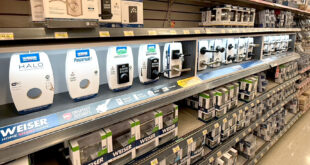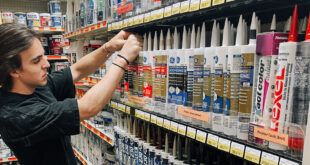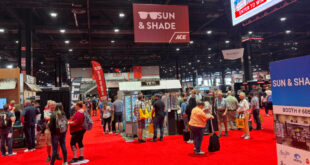To view a PDF of this story, click here.
By Jesse Carleton, jcarleton@nrha.org
Stroke of Genius
Seven years ago, few, if any, painters would have considered Village Ace Hardware a destination for their projects. The 100-square-feet the store had dedicated to the category was more of a convenience. Stiff competition from factory and specialty paint stores had the owners focusing on other core categories.
But today it’s a different story. The Village Ace family of stores, located in the Milwaukee area, now include specialty paint stores, and they’ve become the first choice of do it yourselfers and professional painters alike. Last year, the company sold enough paint to be Benjamin Moore’s No. 1 retailer in sales volume in the state of Wisconsin.
How did they make that happen? Village Ace Hardware got serious about selling paint. While not every independent home improvement retailer may be positioned to dedicate a full store to a single category, the story of Village Ace Hardware’s fast track to the top of its paint market has plenty to show everyone about what it takes to be successful in this rewarding category.
Beginning of Growth
Today, there are multiple locations in the Village Ace family of stores: three full-line hardware stores; two Village Paint & Design specialty paint stores; Village Outdoor Living, a store specializing in outdoor power equipment; and the Hunter Douglas Gallery store, which specializes in window coverings. They are all situated within a short drive of each other in the Milwaukee, Wisconsin, area.
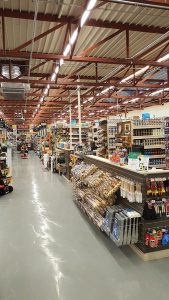
Most of that growth happened within the past decade. Brothers Jim, Mike and Mark Meinecke are second-generation owners of Village Ace, a store their father, Jim, purchased in 1954. Not long after they took over the business about 10 years ago, the brothers purchased a second hardware store. The family had built a solid reputation in the community and a strong business, and now they were ready for new opportunities. That’s when a former employee of a competitor approached them with a proposal.
Tim Stotler had been in the paint sales industry for most of his life when the specialty paint store he was working for closed. “I was really just looking for a job,” he says. “I approached the owners of Village Ace, one of my former employer’s competitors, and told them they had a tremendous opportunity to grow their paint business.”
Stotler’s plan was to rent and rehab a 3,000-square-foot retail space that stood empty next to the hardware store, and turn it into a stand-alone paint store. In addition to having nearly three decades of experience selling paint, he had a working relationship with a wide customer base throughout the city. After setting up the paint store, he would pick up the phone and call his former customers to invite them to his new store. Given Stotler’s experience in the industry, the Meinecke brothers decided to give the plan a try.
Designing a Store for the Pro
Stotler knew that to attract the professional painter, he would need a store that catered to their needs. “I know my customers don’t like walking into a place where they’re not sure if they will get an employee who knows about paint,” he says. “They want specialized treatment. When I worked for a specialty paint store, I would listen to my customers complain about what they didn’t like about going to the average hardware store to buy paint. I knew I had to create a store that avoided those issues.”
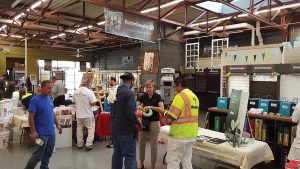
First on the list was assembling a group of experienced employees who were dedicated to the paint department. Paint employees must be able to paint, mix, match and troubleshoot. “You have to invest in people, people who are dedicated to the paint department and won’t spend half of their time working somewhere else in the store,” he says. Paint customers who don’t get the answers they need and can’t find the products they want will go somewhere else.
The other big complaint Stotler often heard from his pro customers was that they don’t like to be treated like just another retail customer. “They don’t want to walk through the middle of a crowded store to get their supplies, and then stand in line with retail customers,” he says.
Stotler says a paint store should have a separate checkout counter and entrance dedicated to pro customers so they can get in and out quickly without having to wait behind slower retail customers. He says those customers also usually demand a discount structure comparable to other paint stores—not only are they buying more paint than traditional retail customers, but they also require less time from a sales staff.
At Village Paint & Design, Stotler could offer everything his customers wanted, and where the pros shopped, retail customers would soon follow.
A Hybrid Store
While there are plenty of merits to having a stand-alone paint store, there are even more to adding in other core hardlines categories. “Our latest store is more of a hybrid,” says Stotler, who is now the operations manager of paint sales at Village Paint & Design. “I call it a hardware store inside a paint store.”
Last year, Stotler and the Meinecke brothers opened a new Village Ace Hardware store in Milwaukee. Customers walking into the store see a full paint and design area occupying about 2,000 square feet at the front, fully capable of serving the needs of any type of customer. While the first Village Paint & Design store had a hardware store next door, this latest store has it inside. Toward the rear of the store is 3,000-square-feet of hardware, which includes a full-line of hardlines categories in addition to a warehouse with a variety of bulk goods and convenience lumber.
It’s a perfect match. Many painters need a few other hardware items after they pick up their paint.
“In addition to painting, many of our pro customers are changing out switch plate covers or replacing the vent covers after they finish a paint job,” he says. “It’s surprising how painters are doing a little bit of handyman work for their customers, much more than they might have 20 years ago. If they need those extra items, they might as well buy them here instead of going somewhere else.”
Just as importantly, after establishing a reputation among the professional painter community, Stotler believes he has a store where both the pro and retail customer can feel at home. In addition to the reputation his business carries as a destination paint store for the pro, he has an outside salesforce dedicated to commercial sales and a product line that goes deep into specialty paint products and sundries. An inviting showroom, a knowledgeable staff and an in-home design service makes the do-it-yourself painter feel comfortable shopping there as well. Each Village Paint & Design stores also offer window treatments.
“The atmosphere around the paint counter is always positive,” Stotler says. “Our paint counter is always busy. People are mingling and networking with each other, both pros and retail customers.”
Vendor Loyalty
Stotler says he believes it would have been a mistake to try to include too many major paint brands on his shelves. He sells Benjamin Moore and Clark + Kensington®, but says whatever vendor a paint retailer chooses, the more business they do with that vendor, the more opportunities they’ll have to take advantage of pricing and special programs.
With three trucks from Benjamin Moore arriving at his store every week, Stotler purchases enough to get volume discounts. His vendor also offers support when he pursues larger commercial accounts.
“One mistake I see some independent paint retailers make is that they cherry pick lines from several paint manufacturers instead of teaming up with one vendor, taking advantage of the pricing structure that is usually there and developing a relationship with that vendor,” he says.
Of course, there are plenty of specialty products he knows he must stock. Village Paint & Design goes deep into sundries—customers have their choice between multiple brands of paint brushes—and specialty products. When a customer searches online for a specialty paint product provider, Stotler wants his store to be first on the list.
The Name Everyone Knows
Stotler has learned to be as much a marketing guru as a paint salesman. One of his best known marketing tools is Benny, the store’s official mascot representing the Benjamin Moore brand. The costumed mascot, created and played by Stotler, draws a crowd wherever he goes. Benny not only creates brand awareness, but he also gets the store involved in the community in a way that is accessible to every age.

Community involvement has always been a priority for Village Ace Hardware, and that didn’t change when the Meinecke brothers introduced paint stores to their company. One service Stotler discovered he could offer the community was paint recycling.
A local business in town accepts old latex paint and puts it through a special manufacturing process to create a UV protectant coating that can be applied to a variety of products. One year, says Stotler, his store helped collect 2,500 gallons of paint. He believes the program is having a positive impact, as residents are recycling their paint rather than dumping it. It also offers Stotler some insights into his customer base.
“By seeing the cans of paint people bring in, we can see our market share in certain areas,” he says. “If we see a lot of cans from another vendor coming from homes in a certain area, we can use that information to know how to target our advertising more effectively.”
Stotler also looks for new ways to present some of the tried-and-true events standard in most retailers’ playbooks. For example, at his wine and cheese event, designers get together to talk about trends while enjoying an elegant snack. Or, he gives them a chance to give product feedback directly to the manufacturer, which is what happened when he invited a local tape manufacturer to hold focus groups with his customers as part of a product research project.
When Stotler was planning a contractor appreciation event to celebrate the grand opening of the latest store, he wanted to offer more than just the standard hot dog and popcorn fare. He contacted a couple of local food trucks and paid them to cook up a lunch for his customers.

“Doing that took the weight off my shoulders of planning a meal, and the price was comparable to a caterer,” he says. “We got a great response from our customers. We’d like to use the idea for future events and expand it to more trucks.”
More than 150 contractors turned out for the grand opening, and the enthusiasm present at that event is evidence Village Paint & Design is not just another paint store. For the customers crowding around the paint checkout counter, it’s now their first stop.
 Hardware Retailing The Industry's Source for Insights and Information
Hardware Retailing The Industry's Source for Insights and Information




